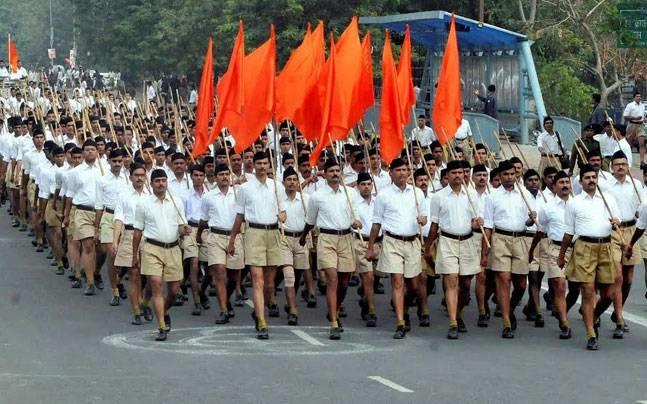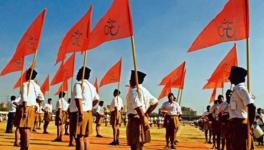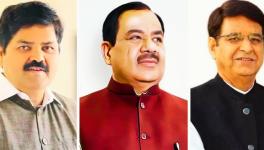RSS: Blazing Out From The Shadows

We must thank Shri Mohan Bhagwat for his recent three-part address at the Vigyan Bhavan. He has finally taken the media obsession away from Narendra Modi and the Bharatiya Janata Party (BJP).
Instead, Bhagwat is refocusing it on the Rashtriya Swayamsevak Sangh (RSS), the mother organisation of the Sangh Parivar. Born in the same month and year as Narendra Modi, Bhagwat has revised the image of the RSS as a cabal of old and wise men who simply interfere with the younger, dynamic, practical politicians of the BJP. Bhagwat’s recent speech breathes the scent of a new destiny that the RSS has acquired in recent times, especially after the emergence of the BJP as a dominating force in Indian politics since the last elections.
By giving this speech in the heart of Lutyens Delhi, Bhagwat succeeded in surprising his critics and befuddling BJP media propagandists who are always one party pamphlet behind in their reading. The RSS has traditionally been a secretive organisation, interested in spreading itself bit by bit, person by person. This model of molecular expansion has now been reversed with a new-found self-confidence.
Sarkari venue
The truly important feature of Bhagwat’s speech was the unabashed publicity it gave to the RSS. Vigyan Bhavan is, of course, the traditional sarkari venue for important conferences on national and international affairs. It helped that Doordarshan News and Rajya Sabha TV recorded and publicised the entire speech. Bhagwat spoke from the very centre of the governmental culture of the nation. There had been speculation about such an event after former President Pranab Mukherjee’s visit to the RSS headquarters, but the scale of the proceedings exceeded expectations. A fair number of celebrities attended the event, and some channels had separate programmes about the visitors. Bollywood stars such as Nawazuddin Siddiqui, Manisha Koirala and Anu Malik provided glamour.
Bhagwat made it clear at the beginning that he was interested in impacting on influential opinion makers of Delhi. He flew in after his engagement at Chicago where he commemorated Vivekananda’s Chicago Address with a fluent speech in English. His Vigyan Bhavan speech did not shy away from using English words and sentences, clearly signaling that he was appealing to a cosmopolitan audience. In fact, the title of his speech “The Future of Bharat” consciously echoed Vivekananda’s essay on the “The Future of India”, signaling that he was doing for the RSS in India what Vivekananda had done for neo-Vedantic Hinduism in the world. This was indeed a sublime intention executed at an appropriately sanitised venue. Here one did not need to worry about the gory tales of lynching, riots and the cultivation of fear that has marked our polity in recent times. He could focus on giving a positive direction to all the negativity that we have been witness to in the recent past.
Focus on ‘modernity’ of RSS
Bhagwat underlined the modernity of the RSS. He focused his historical narrative – a crucial element of RSS ideology—on the modern period. He did mention ancient values as a distinguishing sign of Bharat, but did not really elaborate these. There was no mention of the medieval period with its suffocating story of endless battles with Muslims. Instead, there was a new four-fold typology of the Independence movement in which the Congress was patronised as a strand that had made important contributions but which today, was now one that had become an “also ran”. The long-lasting strand of the freedom struggle was unsurprisingly the Hindu one with its milestone in Vivekananda, but including others such as Dayanand Saraswati.
The focal point is that the RSS has extended this tradition by becoming the foundation of Hindu society. This new aspiration explains why the RSS has become so public, to the extent that Bhagwat repeatedly asked his audience to visit RSS shakhas. Surprisingly, he dwelt on how Hindu society was based on differences. There was some reference to Sanskriti, but the talk did not dwell on common symbols and observances. The theme of difference-in-unity is, of course, a staple in the RSS. K.S Sudarshan (former RSS sarsanghchalak) had described Hindutva as a necklace that strung together various differences. This ornamental trope was repeated by Bhagwat but he gave it substance. The general tenor of his discourse was that the RSS recognises differences, but that the RSS will control the differences. That he was willing to give room to differences was signaled in the revised attitude to the Constitution.
The 1961 resolution of the Akhil Bharatiya Pratinidhi Sabha—the highest decision-making body of the RSS -- had unambiguously declared that the federal structure of the Constitution had to be replaced by a unitary one to safeguard “single nationhood.” Now, Bhagwat claimed that the Constitution expressed the consensus of the country and that the RSS was dedicated to maintaining it. There was also an interesting aside on language in his Q & A session. Bhagwat dwelt on the fact of differences that existed within Hindi itself and then went on to talk about the need to evolve a single language for the country.
Indeed, one of the key themes of his speech was that Hindutva was a process, albeit a directed one. He cited the example of Dr Hedgewar who apparently gave the core idea of Hindutva to his initial followers and then let the organisation evolve on its own with its lathi and sword plays, parades and so on. This is a major departure from earlier RSS stories of Dr Hedgewar. The biography edited by H.V.Seshadri, attributes the development of the shakhas to Dr Hedgewar himself and helped by some companions.
Iron-Clad Premise
The openness to the future, however, has an iron clad premise. The first is that the citizens of Bharat are Hindu. They may not feel they are one or may even have interested motives in denying it, but they will finally have to admit that they are Hindu. It is the RSS to which they will be finally headed, since it safeguards the samskaras that represent the true Hinduism uncorrupted by history. The second premise is that the differences of opinion have to be based on the idea of India as Bharat: a nation shaped by the feeling of being Hindu. It involves reverence for Bharatmata, for the nation’s past and a readiness to defend it. The singular conception of the nation – that brooks no debate – would ensure that differences will not become divisions that imperil the security of the country.
The model that Bhagwat holds out for Hindu society resembles the Sangh Parivar. He envisions an RSS member in each village who would be an example to his fellow villagers by his nationalist virtues and thereby tie everyone in bonds of fraternity. Following the path of trained members, ordinary members of society could follow their own vocation and develop their own ways of thinking, but subject always to the unyielding discipline of the Hindutva nation. Indeed, the identification of the RSS with Hindu society is so deep that Bhagwat claims caste problems can ultimately be resolved only by the RSS as it expands its social base and becomes even more inclusive. The RSS will make caste redundant by the passion for Hindutva.
Bhagwat’s self-confidence is built on the unparalleled marginalisation of Muslims in India today. There are no elected representatives from the Muslim community in the governing party, the BJP. Muslims have also been the target of vicious campaigns that have either worked serially or together to vilify and even kill. Grisly crusades of ghar wapasi, mob lynchings, love jihad, infiltration from Bangladesh, and riots of different intensities have surrounded the everyday lives of Muslims. Bhagwat no longer needed to repeat the rhetoric of Muslim aggression. He explicitly made a distinction between the RSS today and Golwalkar’s unequivocal anti-Muslim proclamations.
The ‘successful’ campaign against Muslims has been accompanied by a triple offensive against educational institutions: syllabus changes that inculcate the singular idea of Hindutva India, administrative control and student mobilisation. The latest offensive has been the demonology of ‘Urban Naxals’ and the arrests of civil rights activists.
Larger Ambitions
The RSS appears to see a clear road ahead for itself. It is willing to publicise itself as an organisation dedicated to safeguarding the morality of the nation, distanced from the dirt of political life.
Bhagwat denied that the RSS is a “remote control” of the BJP. What he held back was the RSS has larger ambitions. It has set itself to become the moral big brother of Hindu society that will oversee the politics of the country and not just the BJP.
The RSS aspires to evolve a common consensus on the Hindutva nature of the nation as the basis of political activity itself. Within these limits set by the RSS, political parties, groups and individuals will be able to function, even flourish much like the Sangh Parivar itself. The RSS will play an independent role to set the limits to what political parties can do.
Bhagwat said truth needs power to establish itself. So, governance by the BJP has given the RSS the power to proclaim and execute the ‘truth of Hindutva’. The BJP has nearly fulfilled the brief it was given. The RSS will now seek to combine their truth with their self-proclaimed authority.
(Pradip Kumar Datta teaches at Jawaharlal Nehru University, Delhi, and has written on identity formations in India and on the Hindu Right).
Get the latest reports & analysis with people's perspective on Protests, movements & deep analytical videos, discussions of the current affairs in your Telegram app. Subscribe to NewsClick's Telegram channel & get Real-Time updates on stories, as they get published on our website.
























